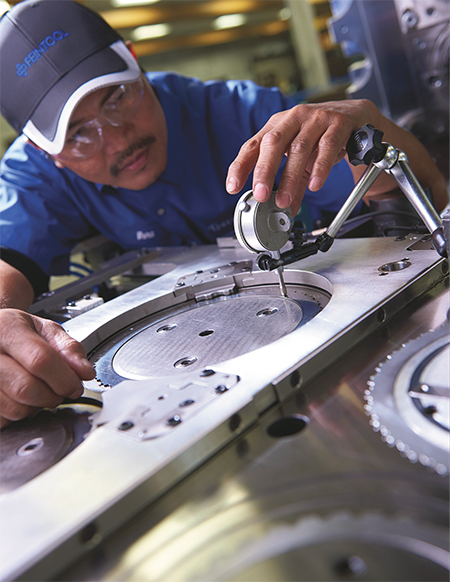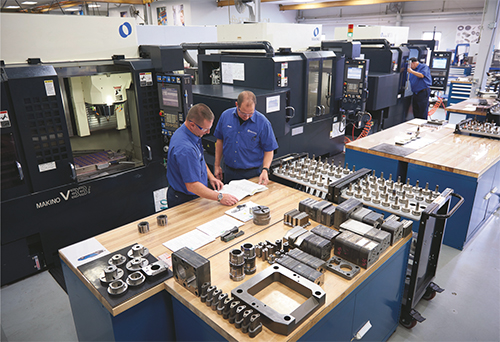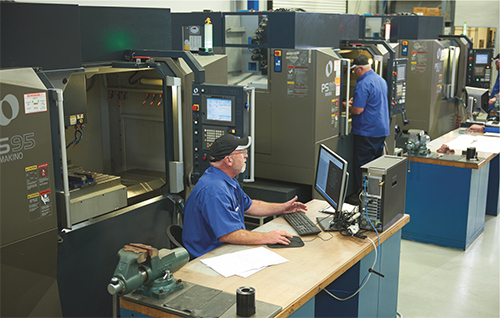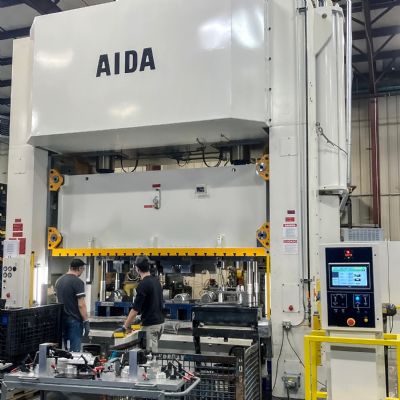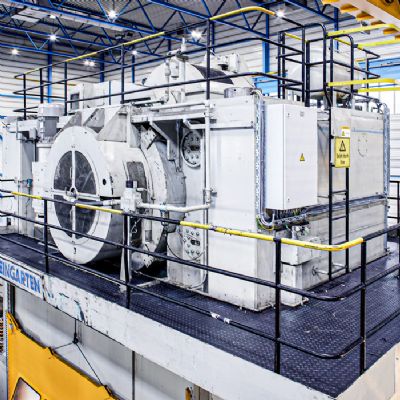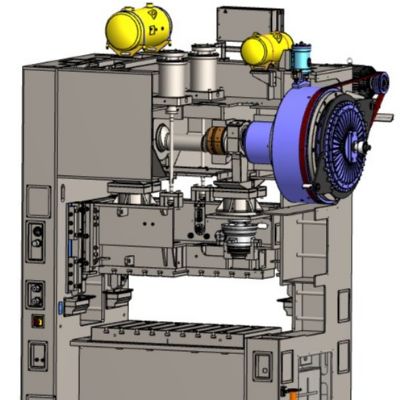Maximizing Investments with Process Optimization
Feintool’s success in adopting high-precision hardmilling capabilities has been based not only on its acquisition of new machine technology but also on the knowledge and experience of the company’s engineers who have become more innovative in their processing techniques. As part of the company’s continuous-improvement initiative, engineers recently took aim at maximizing machine-utilization rates by increasing annual cutting hours on each V33i from 4500 to 6000/yr. By increasing cutting time on the V33i machines by 1500 hours annually, the company was able to achieve necessary production capacity without investing in a fourth VMC.
According to Andres, Feintool engineers are continuously evaluating new process optimizations to get the most out of machine investments, including programming refinements, cutting-tool selection and improved workholding solutions. One example is the recent adoption of magnetic worksholding. With previous clamping methods, Feintool was limited in the number of tools that it could machine in a single setup. By switching to magnetic workholding, engineers now can maximize space within the work envelope to optimize productivity.
“Once we adopted magnetic workholding and began performing longer runtime setups, we were able to get even more value and return from our V33i machines,” says Castle. “It enabled us to fully take advantage of the machines’ rigidity, thermal-control features, broken-tool sensors and expanded tool changers. Today, we reliably run setups for upward of 12 hr. of continuous cutting with small-diameter endmills, maintaining 10-micron repeatability throughout.”
Additional Investment Cuts Costs and Lead Times
In addition to its advancements in hardmilling processes, Feintool also has made significant investments in its preheattreated-machining capabilities through the acquisition of three Makino PS95 VMCs in 2014.
Prior to these investments, Feintool had been outsourcing most of its preheattreated machining processes. Some preheattreated machining had been processed inhouse on a set of older mills that struggled to handle the forces necessary to perform heavier cutting operations. To reduce lead times, decrease costs and gain more control over the tool-making process, Feintool decided to invest in internal machining capabilities.
“The PS95 machines are workhorses that do an exceptional job of heavy cutting, and in a pinch can even support some of our finishing processes in hardened steel,” says Andres. “Through these acquisitions, we’ve been able to eliminate $500,000 each year in outsourcing, enabling us to pay off all three machines in just one year.”
Today, Feintool’s preheattreated-machining processes are performed faster and with better quality, according to company officials. This performance has enabled the company to not only reduce lead times for customers but also expedite prototyping processes to help customers get products into market faster.
Continuous-Improvement Culture Drives Successes
Considering the pursuit of continual improvement as essential to the company’s long-term competitiveness, Feintool’s leadership and its engineering team share a number of aggressive goals to further improve the quality, delivery and cost of its fineblanking-parts services.One of Feintool’s short-term goals involves evaluating processing enhancements to reduce or eliminate long-runtime machine processes, such as jig grinding and EDM. The company believes that it can save a significant amount of time and investment by replacing these processes with precision milling.
“At this time, there are still many types of processes that just can’t be milled; however, the precision of the Makino equipment allows us to minimize the requirements of these processes for shorter lead times and lower costs,” says Andres. “To date, we’ve been able to reduce sinker-EDM processes by approximately 30 percent and wire-EDM processes by roughly 10 percent. And there’s more opportunity for further improvement.”
Increased tooling output resulting from Feintool’s milling investments also have put a strain on the company’s existing jig-grinding capacity. Rather than invest in a second jig-grinding machine, the company is evaluating ways that it can use the V33i machines for some jig-grinding processes.
“To properly serve a high-volume, high-precision market such as automotive, flexible and reliable equipment is essential,” says Trachsler. “To not deliver is not an option. Our investments in this precision vertical-machining equipment have supported us in adapting to changes in part complexities, tolerance requirements and delivery times. No matter what challenge comes our way, Feintool is prepared to deliver parts faster, better and at a lower cost than the competition.” MF
Article supplied by Makino Inc., Mason, OH; 513/573-7200, www.makino.com.
View Glossary of Metalforming Terms
See also: Feintool US Operations, Inc., Makino Die/Mold Technologies
Technologies: Stamping Presses






